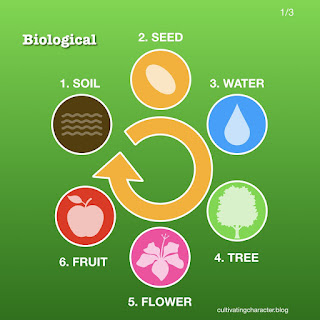Stages of Character Development
A 6 stage cycle for character development is revealed when the parable of the sower is combined with other farming or planting metaphors and similes found in the Bible that are used to explain spiritual development. This blog post briefly summarizes the process by breaking down the combined metaphors and similes into 3 components: the vehicle in Figure 1 is the biological life cycle of a plant, the tenor or topic in Figure 2 are corresponding Biblical symbols and Figure 3 the practical application.
 |
| Figure 1 |
 |
| Figure 2 |
 |
| Figure 3 |
Stage 1: Soil
Biological: Soil provides anchorage for plant roots and holds water and nutrients essential for plant growth. Soil condition is important to the growth of healthy plants, therefore cultivators make sure that the soil is suitable before sowing seeds.
Biblical: Soil represents the heart. In the parable of the sower, found in Matthew 13, four types of soil conditions are described: roadside, thorny, rocky, and good soil. These soil types are explained respectively as the heart condition of those who don't understand the word of the kingdom, those too overwhelmed by the concerns of life to focus on applying the word, those discouraged by social pressure from applying the word, and those with the right heart condition to receive and implement the word.
Practical: Heart is the mind driven by emotions. Emotions it turns out are the prime indicators of our needs. Psychologist Abraham Maslow’s outlines a hierarchy of needs that arranges needs in a particular order that needs must be addressed before a human can pursue the next need. The hierarchy of needs correlates well with the soil types of the parable.
Stage 2: Seed
Biological: Seeds contain the embryo of a plant and endosperm, the initial food needed by the plant. The seed can remain dormant for years until it experiences the right conditions for growth.
Biblical: Seeds represent the word of the kingdom of God as specifically taught by Jesus Christ. See Matthew 13:19. These are a particular set of principles for living that Jesus Christ promises would make the practitioner’s life more abundant.
Practical: Seeds can be a idea that a person adopts that governs their life. There are other principles for living, such as wealth acquisition, when adopted dominate and direct all of the decisions of an individual.
Stage 3: Water
Biological: Water is the fluid that transports nutrients to and through a plant. It's presence also biochemically signals to the plant embryo in the seed that it is time to grow.
Biblical: In the Bible water is associated with learning God’s way. In Psalms water is used in a metaphor describing the benefits of meditating on God’s law (Psalms 1:1-3) and New Testament water is used to describe how Apollos ministered as a diligent teacher to new believers elaborating on the word taught by the Apostle Paul (1 Corinthians 3:6, Acts 18:24,25).
Practical: Through study a person learns more about and how to apply the principles that she or he desires to adopt.
Stage 4: Tree
Biological: Tree is an living organism, a plant, that typically has a trunk, branches and leaves. They make their own food through the process of photosynthesis in which light is converted into sugar.
Biblical: Tree represents the spirit. Spirit is described as an entity that inhabits an individual and influences their actions.
Practical: Spirit seems to describe a person’s character or disposition. A person who plants and adopts certain principles in her or his mind will grow a character informed by those principles.
Stage 5: Flower
Biological: Flower is the reproductive part of a plant that through pollination in which pollen is transferred from one plant to another resulting in the fertilization and creation of seeds.
Biblical: Flowers refer to a person’s appearance, the image that they project to others. The focus on the external appearance is viewed negatively as superficial and not long lasting. “Your adornment must not be merely external—braiding the hair, and wearing gold jewelry, or putting on dresses; but let it be the hidden person of the heart, with the imperishable quality of a gentle and quiet spirit, which is precious in the sight of God.”1 Peter 3:3-4. “Let your light shine before men in such a way that they may see your good works, and glorify your Father who is in heaven.”- Matthew 5:16
Practical: Appearance or image draws people to an individual creating an opportunity to fellowship. This is how the exchange or pollination of ideas between likeminded individuals occur.
Stage 6: Fruit
Biological: Fruit are the fleshy or dry structures that carries a plant’s seeds. They are a food source for animals who in turn transport the seeds to other locations therefore they need to be appealing to the eyes and taste. The quality of the fruit also influences cultivators in their process of seed selection. The seeds from the fruit that exhibits desirable qualities are selected.
Biblical: The fruit of the spirit are love, joy, peace, patience, kindness, goodness, faithfulness, gentleness, and self-control. See Galatians 5:22-23.
Practical: Fruit represents behavior which is the way in which a person acts in response to a particular situation or stimulus. These reactions to both internal and external conditions are produced by the brain by using preset programs of action.


















Comments
Post a Comment